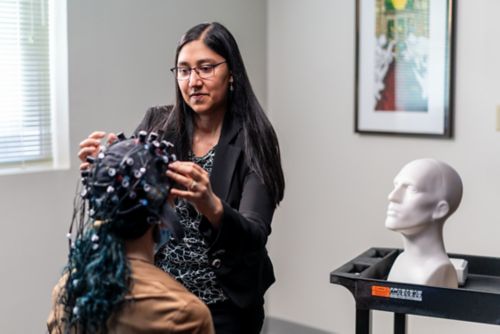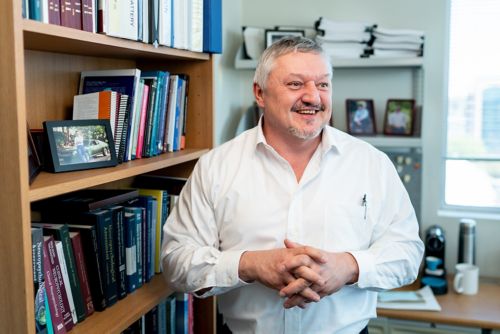St. Jude Family of Websites
Explore our cutting edge research, world-class patient care, career opportunities and more.
St. Jude Children's Research Hospital Home

- Fundraising
St. Jude Family of Websites
Explore our cutting edge research, world-class patient care, career opportunities and more.
St. Jude Children's Research Hospital Home

- Fundraising
Kevin R. Krull, PhD
Exploring mechanisms that underlie the neurological and cognitive effects of cancer and its treatment and evaluating ways to improve the lives of pediatric cancer survivors
Overview
Pediatric cancer and therapeutic approaches often expose patients to undesirable effects in brain development and cognitive functioning. My research explores the mechanisms that underly the neurological and cognitive effects of cancer and cancer treatment and evaluates various interventions to improve the long-term quality of life of pediatric cancer survivors.

Krull research summary
The trajectory of brain development can be altered and negatively affected by the cancer itself and the chemotherapy and radiation required to treat it. Understanding the mechanisms that alter the developmental trajectory is critical to forming effective and specific interventions that may lead to a higher quality of life. Our research follows patients from diagnosis through older adulthood and aims to identify mechanisms underlying alterations in brain development and reserve. With more information about these underlying mechanisms, we work to enhance interventions that improve survivor outcomes.
As part of the Department of Epidemiology and Cancer Control and the Department of Psychology and Biobehavioral Sciences, my colleagues and I conduct multidisciplinary research that involves both characterization and interventional approaches. Our characterization work, conducted primarily for patients with leukemia and lymphoma, assumes a biological, psychological, and social perspective as we study direct action within the brain. Through this approach, we examine biomarkers in the cerebrospinal fluid and assess brain imaging as well as cognitive function. Because brain function is influenced by cardiopulmonary, endocrine, inflammatory, and other processes throughout the body, we take a comprehensive whole-body approach to comprehend how these processes impact the brain. Our comprehensive approach provides the necessary information to develop more precise and targeted interventions.

Along this line of research inquiry, we work with the Center for Proteomics and Metabolomics to conduct a full proteomic characterization of the cerebrospinal fluid prior to and throughout treatment in patients who have leukemia. This characterization identifies proteins that associate with the integrity of glial cells and astrocytes as well as the structure and integrity of neurons and many processes in the central nervous system (CNS). Using mass spectrometry, we can identify more than 2,000 proteins and determine which elements impact CNS integrity and are associated with long-term brain development.
Our intervention work involves enhancing health behavior and direct brain stimulation. Improved health behaviors, like sleep and physical activity, can support brain development and function. We also use an approach called neuromodulation, an example of which involves the use of electrodes on the surface of the head to modulate neural activity with low levels of electrical stimulation. We conduct transcranial direct-current stimulation as well as transcranial alternating current stimulation, depending on where a patient’s deficit is located in the brain. This type of neuromodulation lowers the threshold for the brain to function, allowing us to engage affected areas more easily. Using this approach, a patient can engage in a cognitive task (like practicing memory skills) to fine tune the brain’s network to an improved functional state. We also employ a process called photobiomodulation, which uses a near-infrared light that penetrates the skull to decrease inflammation and oxidative stress to help improve overall brain function.
The improvement of neurological development and cognitive function in patients and survivors of childhood cancer is a driving force for our work. By understanding how and why these neurocognitive effects occur, we hope to contribute to interventions that increase quality of life.
Krull selected publications
About Kevin R. Krull
Dr. Kevin R. Krull is a Member and Chair of the Department of Psychology and Biobehavioral Sciences as well as an Endowed Chair in Cancer Survivorship at St. Jude. He received his PhD in Clinical Psychology and Neuroscience from Florida State University and has held several distinguished and founding positions in the field of pediatric neuropsychology at prominent institutions. Krull currently serves on the editorial board and as an ad-hoc reviewer for numerous journals. In addition to leading his research group, he serves as the co-chair for the Neuroscience Working Group as part of the Cancer Control and Survivorship Program at St. Jude.

Contact Kevin R. Krull
Kevin R. Krull, PhD
Member, Chair
Department of Psychology and Biobehavioral Sciences
St. Jude Children's Research Hospital
Memphis, TN, 38105-3678 USA

Memphis, TN, 38105-3678 USA GET DIRECTIONS